Music festivals play a vital role in boosting local economies, enhancing cultural significance, and fostering community connections. They generate substantial revenue through ticket sales and local business support. Festivals also promote cultural expression and inclusivity, creating shared experiences among diverse groups. Additionally, they adapt to audience preferences and technological advancements, ensuring their relevance in a changing landscape.
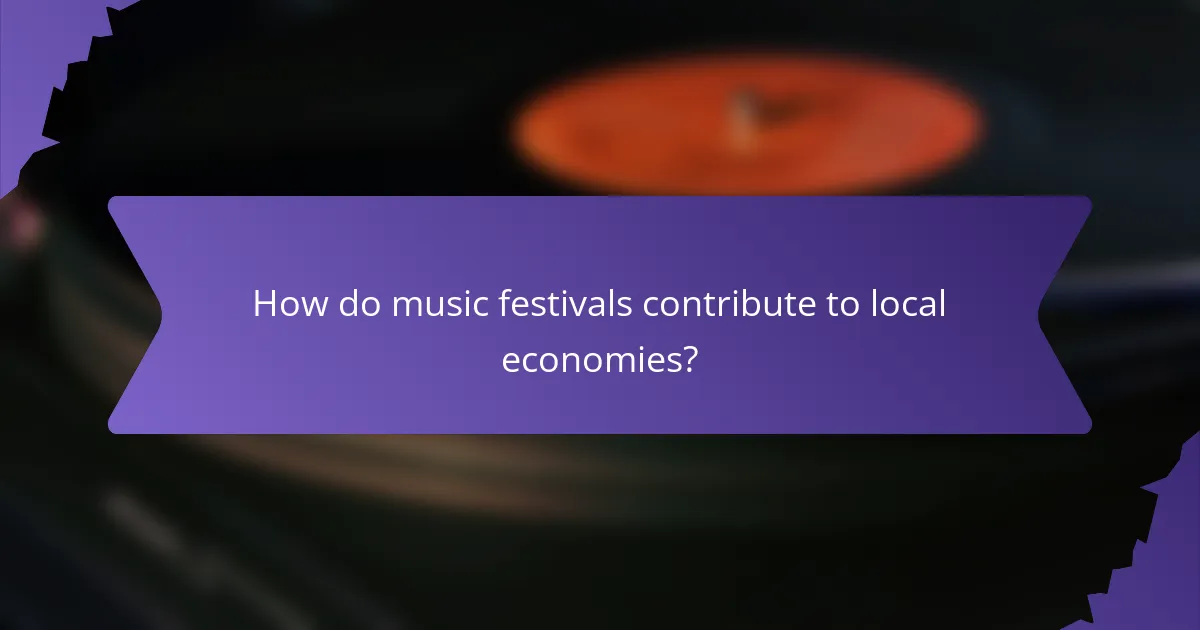
How do music festivals contribute to local economies?
Music festivals significantly boost local economies by generating revenue, creating jobs, and attracting tourism. They contribute millions in economic activity through ticket sales, merchandise, and food vendors. Festivals often employ local workers and stimulate nearby businesses, enhancing community engagement. For instance, a 2020 study found that a major festival generated over $10 million in local economic impact.
What are the direct financial benefits of hosting music festivals?
Hosting music festivals generates significant direct financial benefits, including increased tourism revenue, job creation, and local business support. Festivals attract visitors who spend on accommodations, food, and entertainment, boosting the local economy. For example, a study found that a single festival can inject millions into the host city. Additionally, festivals create temporary jobs in various sectors, contributing to employment growth. Overall, music festivals serve as powerful economic engines for communities.
How do music festivals create job opportunities and stimulate local businesses?
Music festivals create job opportunities and stimulate local businesses by attracting large crowds, which boosts spending in various sectors. They generate direct employment in event management, security, and hospitality, while also benefiting local vendors and service providers. Festivals can increase tourism, leading to higher occupancy rates in hotels and increased patronage for restaurants and shops. For example, a study found that music festivals can contribute millions to local economies through ticket sales and associated spending. This economic impact fosters community engagement and cultural exchange, enhancing the overall significance of these events.
Which economic challenges do music festivals face in different regions?
Music festivals face various economic challenges that differ by region. Factors include funding sources, ticket pricing, and local economic conditions.
In North America, high operational costs and competition for sponsors strain budgets. In contrast, European festivals often benefit from government support but face regulatory hurdles.
In developing regions, limited infrastructure and lower disposable income restrict attendance and revenue potential. Festivals must adapt to local economic realities to thrive.
Understanding these regional differences helps organizers create sustainable models that enhance cultural significance and community engagement.
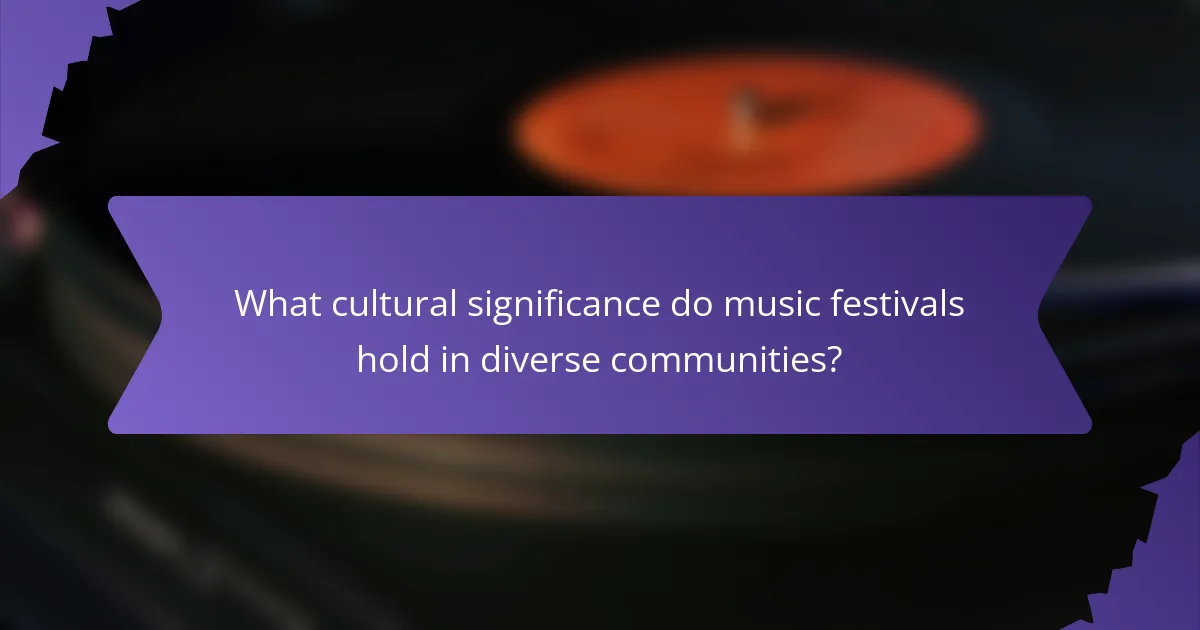
What cultural significance do music festivals hold in diverse communities?
Music festivals hold significant cultural importance in diverse communities by fostering unity and celebrating heritage. They serve as platforms for cultural expression, allowing various groups to showcase their traditions and art forms. Festivals often promote inclusivity, bringing together individuals from different backgrounds to share experiences and create connections. Additionally, they contribute to local economies by attracting tourism and supporting local businesses, enhancing community pride and identity. Through music, festivals reinforce social bonds and create a sense of belonging among attendees.
How do music festivals promote cultural exchange and diversity?
Music festivals promote cultural exchange and diversity by uniting diverse communities through shared musical experiences. These events showcase various genres, allowing artists and attendees from different backgrounds to interact. This interaction fosters understanding and appreciation of different cultures. For instance, festivals often feature international artists, enhancing exposure to global music traditions. Additionally, cultural workshops and activities at festivals encourage participation and learning, further promoting diversity. Overall, music festivals serve as powerful platforms for cultural dialogue and celebration.
In what ways do music festivals reflect local traditions and heritage?
Music festivals reflect local traditions and heritage through cultural expressions, community involvement, and unique artistic presentations. They often showcase traditional music, dance, and crafts, fostering a sense of identity. Festivals serve as platforms for local artists, promoting regional talent and storytelling. These events highlight culinary traditions, offering local cuisine that connects attendees to the area’s history. Additionally, festivals can revive and preserve endangered cultural practices, ensuring they are passed down through generations.
Which music festivals are recognized as cultural landmarks?
Several music festivals are recognized as cultural landmarks due to their historical significance and community impact. Notable examples include the Woodstock Festival, which symbolizes the counterculture movement, and the Montreux Jazz Festival, celebrated for its musical diversity and heritage. The Glastonbury Festival is renowned for its environmental initiatives and artistic expression. Additionally, the Coachella Valley Music and Arts Festival has become a cultural phenomenon, influencing fashion and social trends. Each of these festivals contributes significantly to their respective communities and the global music landscape.
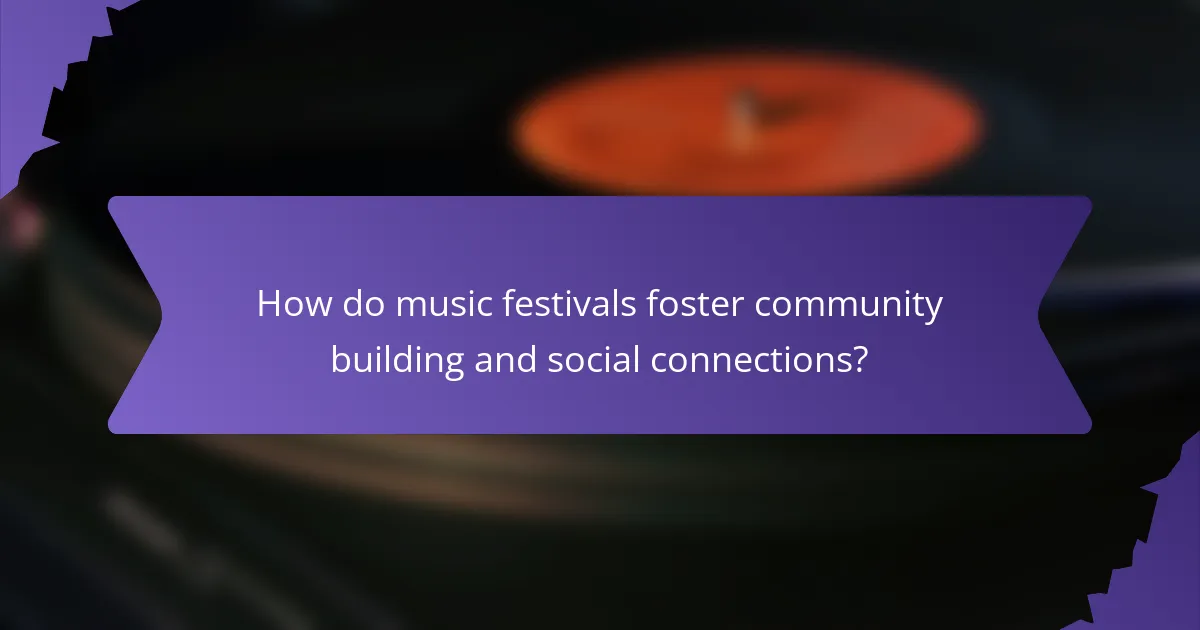
How do music festivals foster community building and social connections?
Music festivals foster community building and social connections by creating shared experiences among diverse groups. These events encourage collaboration and interaction, breaking down social barriers. Festivals often feature local artists, promoting cultural exchange and regional pride, which strengthens community ties. They also provide opportunities for networking and friendship through shared interests, enhancing social cohesion.
What role do music festivals play in enhancing community identity?
Music festivals enhance community identity by fostering social connections and cultural pride. They create a shared experience that unites diverse groups, promoting local traditions and arts. Festivals often stimulate economic growth, benefiting local businesses and creating jobs. As a result, they strengthen community ties and encourage civic engagement.
How do music festivals encourage volunteerism and civic engagement?
Music festivals promote volunteerism and civic engagement by fostering community involvement and providing opportunities for social interaction. Participants often feel a sense of belonging and purpose through volunteering, which enhances their connection to the local culture. Festivals typically rely on volunteers for various roles, creating pathways for individuals to engage with their community. This engagement can lead to increased civic participation, as volunteers often become more aware of local issues and opportunities to contribute beyond the festival.
Which demographic groups are most engaged in music festival communities?
Young adults, particularly those aged 18-34, are the most engaged demographic in music festival communities. This group often seeks social experiences and cultural connections through live music.
Additionally, festival attendance shows higher rates among urban dwellers, who have greater access to events. Research indicates that individuals with higher disposable incomes are also more likely to participate, as they can afford ticket prices and related expenses.
Music festivals attract diverse groups, including families and older adults, but the primary engagement remains with younger audiences. This demographic values the sense of community and shared experiences that festivals provide, fostering lasting connections.
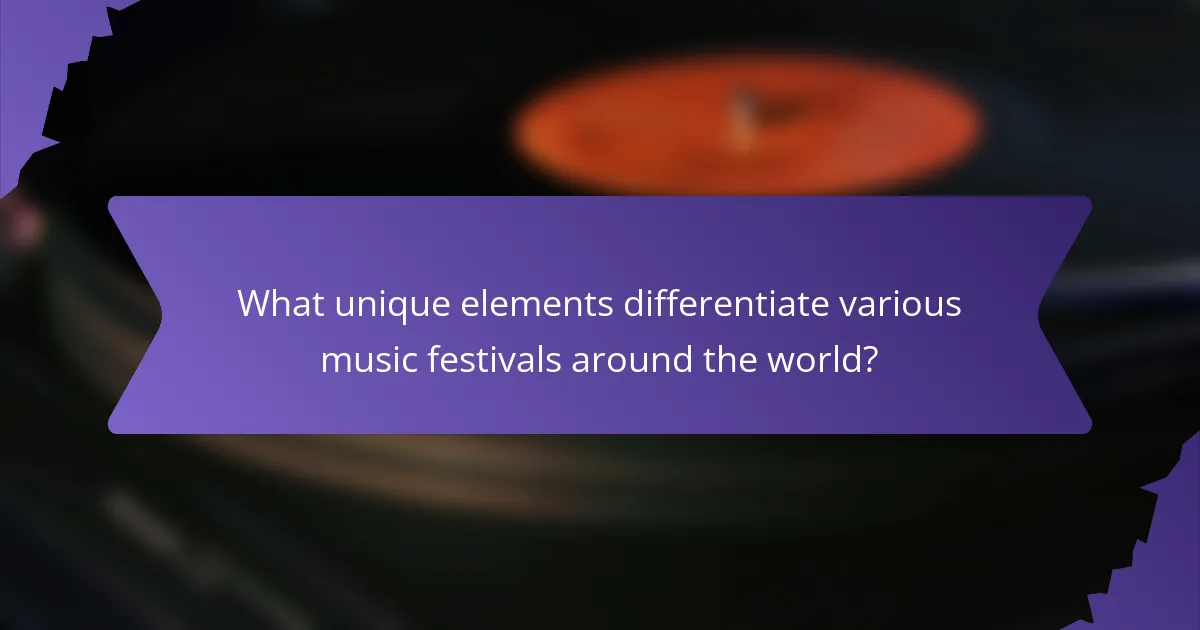
What unique elements differentiate various music festivals around the world?
Music festivals differ through unique elements such as location, genre focus, and cultural themes. Festivals like Coachella emphasize contemporary music and art, while Glastonbury showcases a diverse lineup with strong environmental values. Unique attributes like the Burning Man’s community-driven ethos and Tomorrowland’s immersive stage designs further set them apart. These differences significantly impact local economies, cultural exchange, and community engagement.
How do festival themes and genres influence attendee experiences?
Festival themes and genres significantly shape attendee experiences by creating unique atmospheres and fostering connections. Specific themes, such as cultural heritage or environmental awareness, enhance engagement and emotional resonance. Genres influence music selection, affecting the overall vibe and audience interaction. Diverse genres attract varied demographics, enriching social dynamics. Themed festivals often promote community identity and collective participation, enhancing the sense of belonging.
What innovative formats are emerging in music festivals?
Innovative formats emerging in music festivals include immersive experiences, virtual reality stages, and sustainable practices. These formats enhance engagement and foster community connections. For example, augmented reality apps allow attendees to interact with performances in real time. Additionally, hybrid festivals combine in-person and online elements, expanding accessibility. Community-driven initiatives, such as local artist showcases, highlight cultural significance and promote local talent.
Which music festivals are known for their sustainability initiatives?
Several music festivals are recognized for their sustainability initiatives, including Glastonbury, Coachella, and Bonnaroo. These festivals implement practices such as waste reduction, renewable energy use, and eco-friendly transportation options. Glastonbury, for instance, has a strong commitment to reducing plastic waste and supports local environmental charities. Coachella promotes carpooling and has introduced a comprehensive recycling program. Bonnaroo emphasizes sustainable food sourcing and energy efficiency throughout the event. These efforts highlight the growing importance of environmental responsibility within the music festival industry.
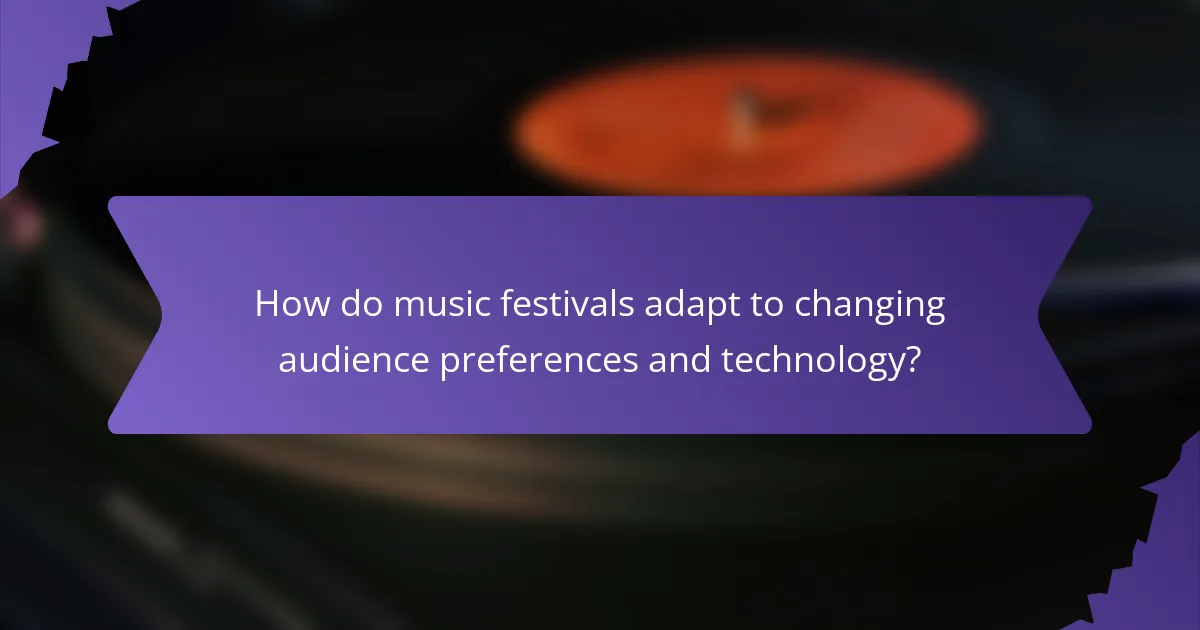
How do music festivals adapt to changing audience preferences and technology?
Music festivals adapt to changing audience preferences and technology by embracing innovation and enhancing experiences. They incorporate digital ticketing, live streaming, and interactive apps to engage attendees. Festivals increasingly focus on sustainability, offering eco-friendly options to attract environmentally conscious audiences. Additionally, they curate diverse lineups and personalized experiences to cater to evolving musical tastes and demographics. The integration of social media amplifies audience participation, shaping festival culture and community engagement.
What impact does social media have on music festival marketing?
Social media significantly enhances music festival marketing by increasing visibility and engagement. It enables festivals to reach wider audiences, fostering community interaction and brand loyalty. Platforms like Instagram and TikTok allow for real-time updates and user-generated content, creating buzz and anticipation. As a result, festivals can leverage social media analytics to tailor marketing strategies, maximizing ticket sales and enhancing attendee experience.
How are virtual and hybrid music festivals reshaping the industry?
Virtual and hybrid music festivals are transforming the industry by expanding audience reach and enhancing engagement. These formats allow artists to connect with global fans while reducing logistical costs. Virtual festivals can attract larger crowds, with some events drawing millions of viewers online. Hybrid models combine in-person experiences with digital access, fostering community building and inclusivity. As a result, these innovations create new revenue streams and diversify the festival experience, making it more adaptable to changing audience preferences.
What trends are shaping the future of music festivals?
Music festivals are increasingly shaped by sustainability, technology integration, and diverse programming. Sustainability initiatives focus on reducing waste and carbon footprints, enhancing environmental responsibility. Technology enhances attendee experiences through virtual reality and mobile apps for real-time updates. Diverse programming attracts broader audiences, fostering inclusivity and cultural exchange. These trends reflect evolving consumer preferences and contribute to the festivals’ cultural significance and community building.
What are the best practices for organizing a successful music festival?
To organize a successful music festival, focus on comprehensive planning, community engagement, and effective marketing strategies. Start by assembling a dedicated team that includes roles for logistics, artist relations, and community outreach.
Next, secure a suitable location that accommodates expected attendance and provides necessary infrastructure. Collaborate with local businesses and organizations to enhance community involvement and support.
Develop a diverse lineup of artists to attract various audiences, and ensure that ticket pricing is accessible while covering costs. Utilize social media and digital marketing to create buzz and engage potential attendees.
Finally, prioritize safety and sustainability by implementing crowd management plans and eco-friendly practices. These elements contribute significantly to the festival’s overall success and positive impact on the community.